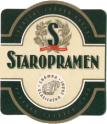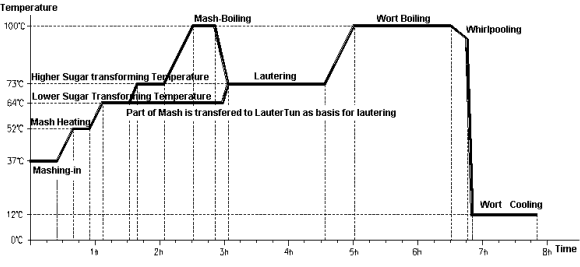 |

|
|

|
|
|
 |

home
about
features
A-Z
books

|

|

Protz:
features
reviews
tastings
|

| |
Czechs and balances
by Willard Clarke, 01/06
A battle is raging over the heart, soul and future of brewing in the Czech Republic. The country that produced the first golden lager in Pilsen in the middle of the 19th century and which has enjoyed iconic status ever since for the uncompromising quality of its beer is now riven by disputes.
And to add fuel to the flames, the European Union is investigating the use of energy in the brewing industry, the end result of which could mean major alterations to both production methods and the appearance and flavour of Czech beer.
Since the end of communism, the Czech brewing industry has seen convulsive changes. The number of breweries has fallen sharply and most of the leading
producers are now owned by global giants.
Pilsner Urquell, Gambrinus and Velke Popovice are part of SABMiller, while Staropramen in Prague was bought first by Bass and then sold on to Inbev.
|
|
 
|
The arrival of the global brewers has led to friction. Budweiser Budvar, based in the South Bohemian town of Ceske Budejovice (Budweis in German) is still state owned and has raised hackles with a campaign called the Ten Commandments that calls into question the methods used by the big brewers. Among Budvar's commandments is a commitment to brewing at source, which is an open criticism of SABMiller for producing Pilsner Urquell - the original golden lager -- in Poland and possibly Russia in the future.
Budvar also put down a marker for using the finest ingredients and more long maturation or lagering. The brewery's 12 degree premium product, which is matured for 90 days, adheres to the ancient German Purity Law or Reinheitsgebot that stipulates that only barley malt, hops, yeast and water can be used to make beer.

|
|
Budvar accuses its rivals of diluting malt with cheap corn starch, drastically reducing lagering time, replacing whole hops with pellets or oil, and even using filtered river water rather than the pure spring variety.
The reaction to the charges was one of anger from the big brewers but support from other small independents that see their market share under attack from the global producers. SABMiller and Inbev say their beers are
better quality today than in the past.
|
SABMiller also states that past and they use better ingredients than during the communist period, and vigorously disputes claims it has cut the lagering period for Pilsner Urquell to 40 days. It says that has always been the length of time the beer has been cold conditioned.
However, both fellow beer writer Michael Jackson and I - visiting and writing separately in the early 1990s - reported that the beer was lagered for 70 days. And the manager of SABMiller's Velke Popovice brewery told me that lagering time there would be cut to 40 days, which suggests that is the group's policy where conditioning and maturation are concerned.
The big brewers' case was weakened a few years ago when Interbrew, the forerunner to Inbev, announced it planned to brew Staropramen at its Samlesbury plant in Lancashire. My enquiries revealed that the beer would be made with the addition of corn starch, while lagering time would be between 20 and 30 days. When I reported this in the Morning Advertiser, Interbrew quickly dropped its plans and Staropramen continues to be brewed exclusively in Prague.
While the row over ingredients and maturation rumbles on, all Czech brewers have been united by proposals from the EU concerning the energy used in the brewing process. A planned EU draft directive will attempt to control energy used by all industries. A EU working group is already drafting a proposal that will determine how much energy can be used and how much waste produced when one hectolitre of beer is made.
Czech brewers say they need some 20 per cent more energy than brewers in other countries to make beer and the difference is even bigger for small brewers. The view at Budweiser Budvar is that the EC's ruling could mean the end for both decoction mashing and long lagering.
Decoction mashing, widely used in the Czech Republic and Germany, tackles the problem of the poorer quality of continental barley malt compared to the "maritime" varieties grown in Britain and the Low Countries.
The problem is solved by using a series of linked vessels during the mashing process, with portions of the mash - the mix of barley malt and pure hot water - pumped from one vessel to another and raised to a higher
temperature before being returned to the original vessel.

[graphic courtesy of brewplants.com]
The system converts starch to fermentable sugar and reduces protein and nitrogen haze. When the long and exhaustive mashing process is complete, the grain is filtered in yet another vessel known as a lauter tun.
If the EU decides that decoction mashing is not energy efficient, the brewers would have to switch to a version of the British system known as the infusion mash, where high quality malt is mashed and filtered in one combined vessel known as a mash tun. As well as being forced to invest in new equipment, the brewers would also have to import expensive maritime malt.
A reduction in lagering time would hit Budvar and other craft brewers in the Czech Republic that believe that slow, long conditioning gives finished beer a finesse, smoothness and complexity lacking from beers that stay in the conditioning tanks for just a few weeks. The global brewers in the republic are already switching from horizontal lagering vessels to conical ones where maturation is faster, and the smaller producers may be forced to follow suit.
If the EU directive becomes law, all brewers will have to comply with its requirements by 2007 or face sanctions or even closure. It is likely that the powerful German brewers will not give up decoction mashing without a fight and their opposition will aid the Czech brewers, too.
EU directives have a habit of being delayed, watered down or sidelined. But with world oil supplies dwindling and global warming becoming a growing threat to the future of the planet, it could be that this will be one directive that will see the light of day in the near future. If so, it will create dramatic changes to the beers of the country that changed the course of brewing in the 19th century and is held in high esteem throughout the world for the quality of its golden Pilsners and Budweisers.
|
|
home
about
features
A-Z
books
|

